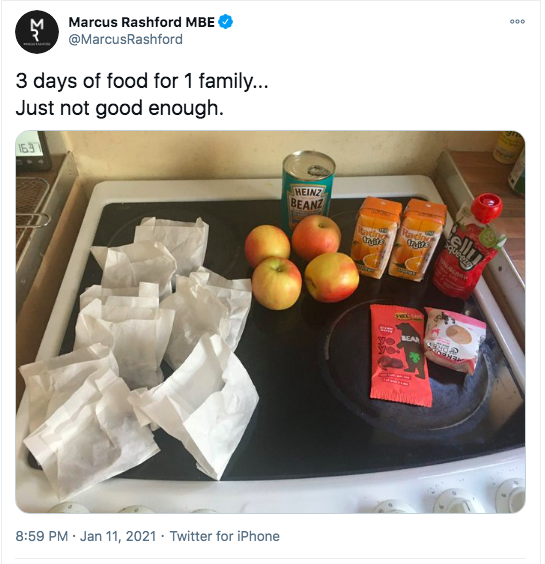The pandemic has not been kind on either libertarians or people in poverty. The libertarian argument that the state should generally leave people alone to make their own choices has not often succeeded as government, largely backed by the electorate, has chosen to respond to a collective risk with collective action, even if some of that action is compelled.
For people on low incomes, Covid-19 has meant more economic hardship and an increased chance of death. It has also meant that their children are more likely to go hungry. At the Social Market Foundation, we reckon 16 per cent of children – nearly two million – went short of food last year.
No one is indifferent to the notion of children going hungry, which is one reason the footballer Marcus Rashford has been such an effective campaigner: he picked the right issue to make noise about. He’s currently taking issue with the quality of food being delivered to the homes of children who would otherwise be in school and receiving free school meals.

Though Rashford has made this ‘news’, this isn’t a new issue: almost as soon as the first lockdown started last March, head teachers started warning that the food being allocated to their FSM kids was unhealthy and inadequate.
In normal times, schools are given £11.50 per week to provide lunches for each FSM-entitled child. During lockdown, that has been increased to £15, with schools strongly encouraged by the Department for Education to spend that money paying catering contractors to provide home food parcels. (Some call them ‘hampers’, a faintly revolting misuse of language.) It is such parcels, provided by contractors, that Rashford is taking issue with. The heat he is generating on the issue means that in due course, ministers will be asked about this in parliament and at press conferences, and the Government will make some sort of promise that Something Will Be Done. And then, dogs all barked out, the caravan of news will move on to something else.
What does any of this have to do with the libertarians I mentioned at the top of this piece? For some lockdown sceptics, child hunger might serve as a good illustration of the economic and social harms being done by Covid restrictions. I’m not opposed to lockdowns, but I do think such harms deserve more attention, especially where they fall on people and children with the least money.
But that’s not the link between FSM kids and lockdown libertarianism I’m interested in. What I’m wondering is why those people aren’t more interested in those hungry kids and their dismal food parcels.
Throughout the pandemic, some people – including several who write for The Spectator – have made the respectable argument that governments should trust people more and should rely on the common sense of the population to do the right thing for public health. The common refrain of Conservative MPs and others questioning lockdown has been that a paternalistic approach does not respect the common sense of the people: adults, it is argued, can be trusted to take rational, sensible decisions about their own health and that of others.
Personally, I’m not wholly convinced by that argument in the case of the pandemic: I think the complexities and second-order societal consequences of individual-level behaviour are just too great for any individual to calculate and act on here. This sort of high-complexity, high-impact population-wide risk is one of the core reasons we have the state – to do things we cannot do alone. That includes, sometimes, taking decisions about how resources are allocated and freedom of choice exercised.
That brief digression into undergraduate philosophy leads me back to those £15 food parcels. A core argument for some libertarians is that the state makes bad choices, allocating resources poorly on behalf of individuals. And it’s pretty hard to look at some of those FSM parcels and conclude that in this case, the state is making the best use of that £15. It’s also hard not to think that someone else, perhaps the parents of the children concerned, might be able to spend it better.
And indeed, the Government has attempted to put some trust in parents with a scheme to issue vouchers that parents could use to buy food in some supermarkets. It’s impossible to say how well that scheme worked because, in the words of the National Audit Office, the government ‘does not know precisely how many children have been supported by the voucher scheme… The Department does not know the value of vouchers that families have used because data are not available from the supermarket chains’. But we do know that the scheme cost at least £384 million.
The Government is spending public money to provide lunches for children eligible for free school meals. In some cases, it is spending that money badly.
Why? Why all this complication and waste? Why contrive a system of contractors delivering parcels of food or issuing an unknown number of vouchers to an unknown number of people to put to unknown use? It comes down to trust: the people making decisions about feeding poor children do not trust the parents of those children. If they did, they’d simply give them the money directly and leave them to feed their kids. There’s even a pretty efficient machine for delivering that cash: Universal Credit, the welfare system whose solid operational showing in the last year has been one of the under-reported successes of the pandemic.
A common feature of this government’s approach to the pandemic has been that it does the least bad thing, but only after trying everything else first. Trying to deliver free school meals to kids at home during lockdown looks like another example. Instead of trying to improve current complex systems of delivery, either via contractors or vouchers, ministers should simply trust parents and give them £15 cash to feed their children. They’re often pretty good at making a little money go a long way, since sadly, they’ve had to be. Just give them cash.
And the ‘trust the people’ champions of individual liberty who rail against paternalistic lockdown measures should redirect their energy and arguments to this cause, where it might actually do some good.







Comments